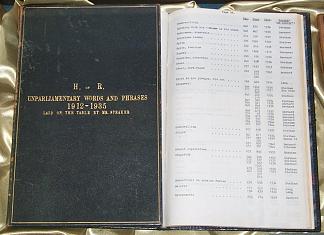Bad language
There's lots of cut and thrust on the floor of Parliament's debating chamber, but there are rules about what can and cannot be said. MPs may not use 'unbecoming' language, personal reflections and insults; they cannot suggest improper motives nor accuse other members or the government of bribery, corruption or dishonesty; and they must not challenge the truthfulness of another MP.
Policing these rules can be a tough job for the Speaker. Many MPs have had to withdraw 'unparliamentary' words and phrases, and apologise. Some pushed the boundaries of the meaning of bad language by using expressions that conveyed their intent without attracting the Speaker's attention. But Speakers were wise to this, and in the 1930s, a 'compendium' of unparliamentary language was compiled.
The following selection of unparliamentary words has been drawn from the indexes at the back of the New Zealand Parliamentary Debates. There such words are listed under the term – 'Speaker, unparliamentary language’. If you want to find out more about the use of these words, just follow the page reference to the use of the words during the debates in the House. This will give you the context in which they were used and the ruling of the Speaker.
1933
- Blow-fly minded
- Financial Frankenstein
- Shrewd old bird
1936
- Fungus farmer
- Pipsqueak
- Stonewalling
1943
- Members hated the sight of khaki
- Retardate worm
1946
- Clown of the House
- Idle vapourings of a mind diseased
- I would cut the honourable gentleman's throat if I had the chance
- Quasi-parsonical
- Skite
1949
- His brains could revolve inside a peanut shell for a thousand years without touching the sides
- Hoey
- Humbugs
- Hypnotized rabbits
1954
- Bluebird
1957
- Kind of animal that gnaws holes
- Trained seals
1959
- Kookaburra
- Member not fit to lick the shoes of the Prime Minister
1963
- Energy of a tired snail returning home from a funeral
- Member a vicious woman
- Sits on his behind
1966
- Labour Party is dominated by an outside body
- Shut up yourself, you great ape
- Snotty nosed little boy
- You are a cheap little twerp
- Ridiculous mouse
1969
- 'Commo' (allowed)
- Duck shoving
- Like a snail leaves a slime behind him
1974
- Scuttles for his political funk hole (allowed)
- Soft-soaping (allowed)
- Could go down the Mount Eden sewer and come up cleaner than he went in
- Dreamed the Bill up in the bath
- Greasy hands
- Grubby little man
- Intestinal fortitude
- Low style
- Mealy mouthed
- Slinking off to another part of the House
- Frustrated warlord
1977
- John Boy
- Silly old moo
- Racist
- 'Sober up'
1980
- Ayatollah
- Ditch the bitch
- Fascist dictator
- Heil Zeig
- Marxist or neo-Marxist
- Member for Pretoria
- Merv the Swerve
- Papanui Parrot
- Quigley Wiggly
- The Arapawa Goat

Compendium of unparliamentary words and phrases.